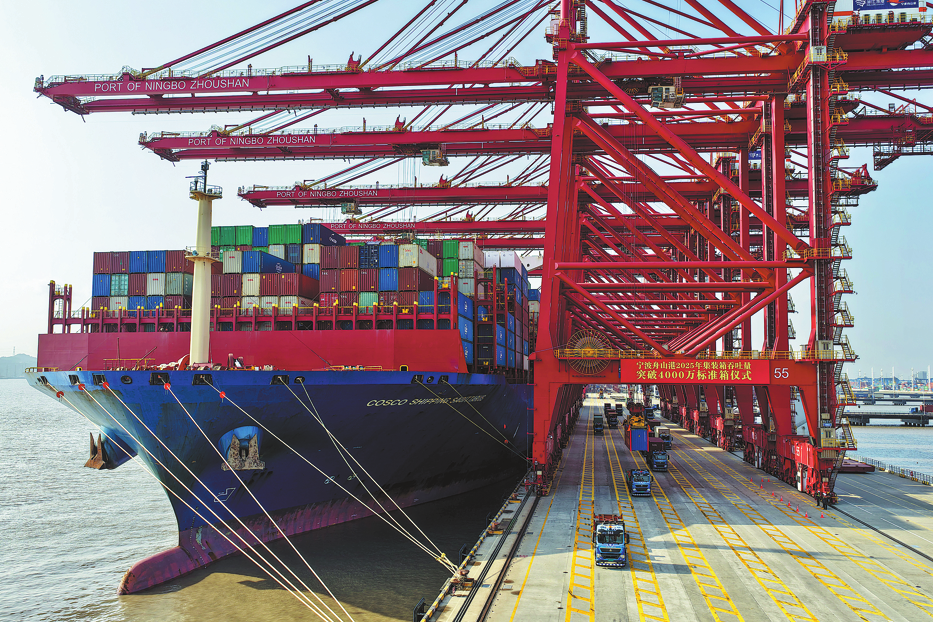At a crossroads


China is responding to the deteriorating security situation in its surrounding areas caused by the US intensifying its containment efforts
China is stepping up efforts to expedite the settlement of disputes in the South China Sea and cope with non-traditional security threats in collaboration with neighboring countries, so as to strengthen strategic mutual trust, make sure that the entire region continues to focus on economic cooperation and ensure a stable environment in its neighboring regions.
Over the past few years, the United States has been intensifying its strategic rivalry with China, which has severely deteriorated the security situation in China's surrounding areas.
The US has been reinforcing its alliance and partnership systems to forge an anti-China camp.
The US-Japan alliance and US-Australia alliance continue to serve as the "northern and southern anchors" of the US alliance system; the US-Japan-Australia and US-Japan-the Republic of Korea trilateral cooperation mechanisms have been further strengthened; and the Quadrilateral Security Dialogue, or Quad — a strategic security dialogue among Australia, India, Japan and the US — has been serving as a core mechanism in the US' "Indo-Pacific Strategy" and the US is attempting to establish a more extensive "united front" against China by expanding the group to the ROK, Vietnam and Indonesia.
In the wake of the outbreak of the Russia-Ukraine conflict, the US has also been speeding up NATO's expansion to the "Indo-Pacific". In June last year, Australia, Japan, New Zealand and the ROK were invited to participate in a NATO summit for the first time, to "initiate a road map for expanded cooperation, ensuring closer political consultation and joint work on issues of mutual interest".
By constantly hyping up the Taiwan question and the South China Sea issue, the US is attempting to "legitimize" its military presence in the region.
Since the outbreak of the Russia-Ukraine conflict, the US, Japan and Australia have been frequently hyping up "Ukraine today, Taiwan tomorrow" to coerce and pressurize more countries to join their alliance.
Adopting a strategy of "using Taiwan to contain China", the US' provocations have substantially increased. Notably, former US House speaker Nancy Pelosi's visit to China's Taiwan region in August last year has pushed the cross-Straits tensions, causing grave concerns among regional countries.
Since the start of last year, the Joe Biden administration has been using an array of regional mechanisms to push forward capacity construction on Maritime Domain Awareness in collaboration with its allies and partners. In May, at the Tokyo Summit, the Quad leaders announced the "Indo-Pacific Partnership for Maritime Domain Awareness". Also in May, a joint statement was released by the US and the Association of Southeast Asian Nations after their special summit, reaffirming that the two sides are committed to advancing cooperation in the maritime domain. In June 2022, Australia, Japan, New Zealand, the United Kingdom and the US launched their partners in the blue Pacific initiative to improve their maritime domain awareness.
By extensively implementing such measures, the US is attempting to realize full coverage of its maritime domain awareness in the entire "Indo-Pacific" region so as to follow and monitor the activities of Chinese ships and make China's maritime activities transparent to the US.
China takes its surrounding region as a priority and major countries as the key in its diplomacy. As the US advances its "Indo-Pacific Strategy", it is confronting China head-on in affairs in China's surrounding areas, making it both the "priority" and "key" of Chinese diplomacy.
To this end, the report of the 20th National Congress of the Communist Party of China reaffirmed the principles of China's diplomacy with its neighboring countries — acting on the principles of amity, sincerity, mutual benefit and inclusiveness, and the policy of forging friendships and partnerships with its neighbors. China will strive to enhance friendly ties, mutual trust and converging interests with its neighboring countries. In reality, the implementation of the Global Development Initiative and the Global Security Initiative in China's neighboring regions before other regions has countered the attempts by the US to contain China.
China should continue to promote economic cooperation with its neighbors to make sure that the regional agenda focuses on economic development, rather than military confrontation.
Jointly promoted by China and ASEAN, the Regional Comprehensive Economic Partnership came into force at the start of 2022. Bilateral trade between China and the ASEAN countries reached a record high in 2022. Bearing more far-reaching significance, the China-proposed Global Development Initiative is being advanced and has gained a positive response from China's neighboring countries. Most of the ASEAN members have explicitly expressed their support for the Global Development Initiative in bilateral cooperation documents with China. In reality, stronger cooperation between China and its neighbors in green development, the digital economy, agriculture, public health and the blue economy not only meets the urgent needs of regional countries for development, but also helps adapt to new trends in regional and global economic development, thus further expanding the bilateral cooperation areas and converging interests.
China should also promote dialogue on security issues, strengthen the institutionalization of cooperation, and reinforce strategic mutual trust with its neighbors.
In face of the complex security situation in its neighboring regions, China is expediting the peaceful settlement of disputes in the South China Sea through negotiation and consultation. In November 2022, China and ASEAN issued a joint statement on the 20th Anniversary of the Declaration on the Conduct of Parties in the South China Sea, which further cements the consensus reached by all parties and strives for the adoption of a Code of Conduct in the South China Sea at an early date through negotiation and consultation.
China is also stepping up efforts to advance the implementation of the Global Security Initiative in its neighboring regions, which aims to achieve security through sustainable development. In the meantime, China has increased its support for its neighbors to address non-traditional security threats, by jointly exploring new ways of governance, proposing new cooperation initiatives in such areas as climate action and public health security, and providing assistance to those countries.
Now and for some time to come, the strategic rivalry between the US and China will be the determining factor of regional situation. But the strategic autonomy of small- and medium-sized countries in the region is rising. Their more diversified strategic choices will to a great extent add uncertainties to the regional situation. This presents both opportunities and challenges to China.
The author is a research fellow with the National Institute of International Strategy at the Chinese Academy of Social Sciences. The author contributed this article to China Watch, a think tank powered by China Daily.


































